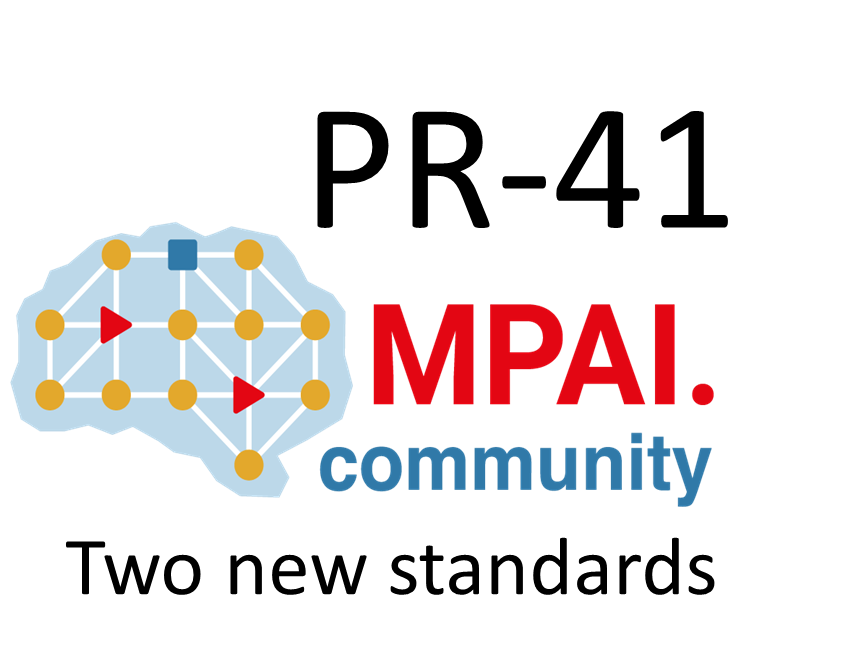Geneva, Switzerland – 21 February 2024. MPAI – Moving Picture, Audio and Data Coding by Artificial Intelligence – the international, non-profit, and unaffiliated organisation developing AI-based data coding standards has concluded its 41st General Assembly (MPAI-41) approving the publication of two standards and announcing the availability of all its standards in linked form on the web.
Context-based Audio Enhancement (MPAI-CAE) V2.1 extends the previously published Version 2.0 adding full online references to the specification of all AI Workflows, AI Modules, JSON Metadata, and Data Types used by the standard.
Human and Machine Communication (MPAI-HMC) V1.0 integrates a wide range of technologies from existing MPAI standards to enable new forms of communication between entities, i.e., humans present or represented in a real or virtual space or machines represented in a virtual space as speaking avatars and acting in a context using text, speech, face, gesture, and audio-visual scene in which they are embedded. It.
In the 11-15 March week, MPAI will be presenting its recently published standards at a series of planned 40-min online sessions. The presentations will illustrate the scope, the features, and the technologies of each standard and will be followed by open discussions. The new web-based access to all published MPAI standards will also be presented. All times are UTC
| Standard | March | Registr. |
| AI Framework (MPAI-AIF) | 11 T16:00 | Link |
| Context-based Audio Enhancement (MPAI-CAE) | 12 T17:00 | Link |
| Connected Autonomous Vehicle (MPAI-CAV) – Architecture | 13 T15:00 | Link |
| Human and Machine Communication (MPAI-HMC) | 13 T16:00 | Link |
| Multimodal Conversation (MPAI-MMC) | 12 T14:00 | Link |
| MPAI Metaverse Model (MPAI-MMM) – Architecture | 15 T15:00 | Link |
| Portable Avatar Format (MPAI-PAF) | 14 T14:00 | Link |
MPAI is continuing its work plan that involving the following activities:
- AI Framework (MPAI-AIF): developing open-source applications based on the AI Framework.
- AI for Health (MPAI-AIH): developing the specification of a system enabling clients to improve models processing health data and federated learning to share the training.
- Context-based Audio Enhancement (CAE-DC): preparing new projects.
- Connected Autonomous Vehicle (MPAI-CAV): Functional Requirements of the data used by the MPIA-CAV – Architecture standard.
- Compression and Understanding of Industrial Data (MPAI-CUI): preparation for an extension to existing standard that includes support for more corporate risks.
- Human and Machine Communication (MPAI-HMC): developing reference software.
- Multimodal Conversation (MPAI-MMC): developing reference software and conformance testing, and exploring new areas.
- MPAI Metaverse Model (MPAI-MMM): developing reference software specification and identifying metaverse technologies requiring standards.
- Neural Network Watermarking (MPAI-NNW): reference software for enhanced applications.
- Portable Avatar Format (MPAI-PAF): reference software, conformance testing and new areas.
- End-to-End Video Coding (MPAI-EEV): video coding using AI-based End-to-End Video coding.
- AI-Enhanced Video Coding (MPAI-EVC). video coding with AI tools added to existing tools.
- Server-based Predictive Multiplayer Gaming (MPAI-SPG): technical report on mitigation of data loss and cheating.
- XR Venues (MPAI-XRV): development of the standard.
Legal entities and representatives of academic departments supporting the MPAI mission and able to contribute to the development of standards for the efficient use of data can become MPAI members.
Please visit the MPAI website, contact the MPAI secretariat for specific information, subscribe to the MPAI Newsletter and follow MPAI on social media: LinkedIn, Twitter, Facebook, Instagram, and YouTube.


